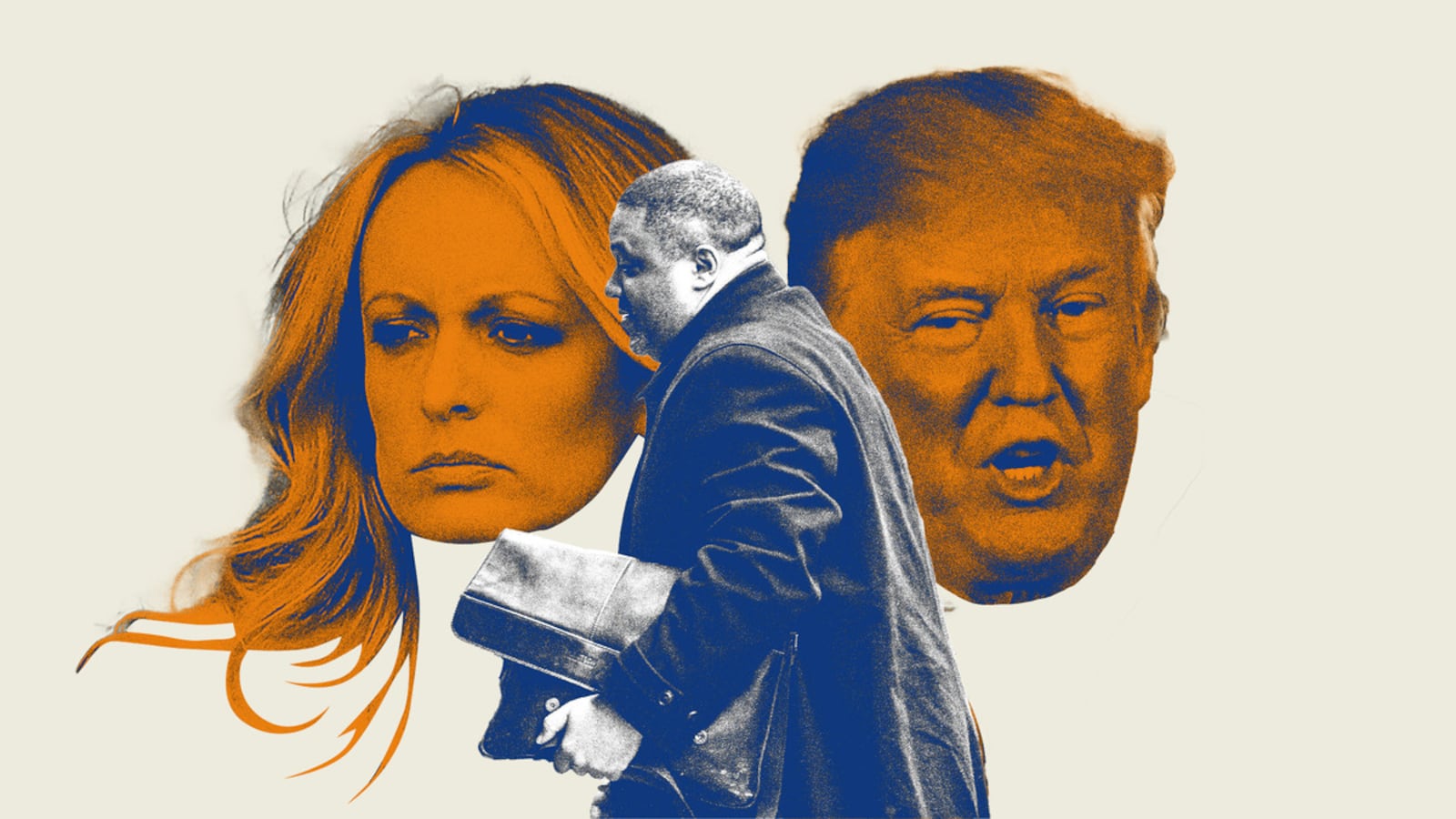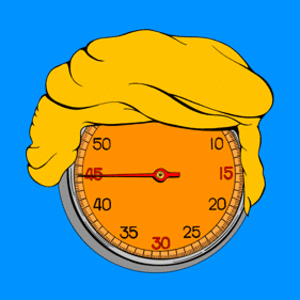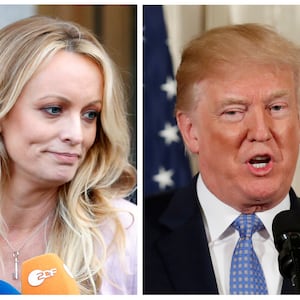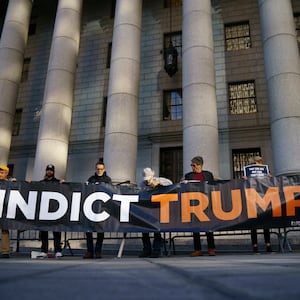The indictment that Manhattan District Attorney Alvin Bragg is currently seeking against former President Donald Trump—over his payment to silence a porn star about their sexual affair—is based on a crime that was so flimsy it was never viewed as a standalone criminal case, according to three attorneys who have worked on that investigation.
These insiders spoke to The Daily Beast on the condition of anonymity, because they are not authorized to discuss the ongoing criminal investigation.
A grand jury may soon decide whether to indict Trump for faking business records and dodging campaign finance laws when he used his company—the Trump Organization—and his personal “fixer”—Michael Cohen—to quietly pay hush money to the adult film star Stormy Daniels to keep the revelation from derailing his 2016 presidential campaign. Journalists from around the globe are now staking out a courthouse in downtown New York City, awaiting the possible arrest of the former American president.
But that criminal probe is just a small slice of a much more expansive criminal investigation into Trump’s lies to banks, insurance companies, and government agencies.
Bragg, who inherited the investigation from his predecessor, Cy Vance Jr., shut down the wider operation soon after entering the office—and only recently revived this narrow portion as a single case.
His decision to bring back what has been deemed the “zombie” case surprised several insiders who have been briefed on the various iterations of the Stormy Daniels case over the years.
“The Stormy case was the easiest, the most straightforward, but had the risk of being nothing more than a misdemeanor. The business fraud case had more heft, but was complex and sprawling, and much more difficult. There was never any discussion of breaking them apart,” one source told The Daily Beast.
What initially drew prosecutors to the case was the way the Trump Organization paid back Cohen in separate checks broken up over a year, engaged in a monthly cover-up using this private business while Trump was in the White House.
But New York County prosecutors never considered pursuing the hush money case by itself, because, for one thing, investigators on the DA’s Trump team couldn’t even agree whether Trump committed a serious crime.
Faking business records is merely a misdemeanor in New York, and three sources said Vance wouldn’t greenlight an indictment that would involve a historic law enforcement action against a former president—all to land Trump less than a year at the city’s notoriously violent jail on Rikers Island.
Still, they determined this particular criminal charge could be bumped up to a felony if business records were faked to commit or hide a separate crime—a fact prosecutors wrestled with for months. A recent tell-all memoir by an ex-prosecutor who previously led that team, Mark Pomerantz, goes into vivid detail explaining how he had to resort to building a “creative legal theory” to pursue the case.
One version entailed this local DA attaching the state charges to the federal crime; after all, the whole idea was that Trump had failed to properly log the hush money payment publicly in closely scrutinized reports filed to the Federal Election Commission. But chaining state-level business records charges to an alleged federal crime would open Pandora’s Box, according to one source, because doing so would conspicuously highlight how this should have been a federal case instead.
And that was quite the risk, because the U.S. Attorney's Office for the Southern District of New York had already chosen not to indict Trump.
Federal prosecutors aggressively went after Cohen and even categorized Trump as “Individual-1,” but they stopped there. The feds gave immunity deals to get incriminating information from the Trump Organization chief financial officer who cut the checks, Allen Weisselberg, and the National Enquirer media executive who helped broker the hush money deal, David Pecker.
“The hush money case had no exact state charge. It should have been the feds,” said a second person who spoke to The Daily Beast.
Assistant district attorneys and their outside advisers were also unclear about whether this novel approach would even hold up in court.
“DANY would have to argue that the intent to commit or conceal a federal crime had converted the falsification of the records into a felony. No appellate court in New York had ever upheld (or rejected) this interpretation of the law,” Pomerantz wrote in People vs. Donald Trump: An Inside Account. “There was a big risk that felony charges would be dismissed before a jury could even consider them.”
The DA team’s second version was even more of a stretch. This one involved attaching the business records charge to a bonkers underlying crime: viewing Stormy Daniels’ attempts to sell her story on the eve of the 2016 election as her trying to extort Trump. In his book, Pomerantz acknowledges this is “a somewhat awkward construction” that would act as if “Trump was, in effect, a blackmail victim.” That would turn Trump’s payment into money laundering, he figured. But the “soft-core extortion” theory, as Pomerantz called it, was hoisted on its own petard.
“Legally, the hush money payment had not become dirty money until [Stormy Daniels] received it, so neither Cohen nor Trump had committed money laundering by sending it,” Pomerantz wrote in his book.
The book says Vance twice commissioned outside lawyers—a rare step that’s nearly unheard of for such a law enforcement office—to research the matter. Vance decided against any criminal charges in late 2019 and revisited the decision in early 2021, but he ultimately decided against it.
The final nail in the coffin, though, seemed to come when Bragg inherited the case at the start of 2022. In his book, Pomerantz recalls a Feb. 9, 2022, meeting during which Bragg said he “could not see a world” in which he would use Cohen as a witness to indict Trump. On Tuesday, a spokeswoman for the office said that four people who were present at the meeting disputed that recollection.
Joe Tacopina, one of Trump’s defense lawyers on this case, told The Daily Beast he wasn’t surprised that lawyers who have long been close to this investigation have their reservations about making the Stormy Daniels matter a standalone criminal case. “I’ve spoken to two FEC chairmen. It’s not even close. I don’t understand how they could do this. It’ll eventually get tossed aside,” Tacopina said.
However, skeptics could view Bragg’s recent decision to hire a top attorney at the Department of Justice as a way to overcome concerns that the state case can’t hold up on its own—or is somehow weakened by the DOJ’s decision to not charge Trump even after leaving office. Matt Colangelo, who left an extremely prominent position as the nation’s acting associate attorney general, previously worked on fraud investigations against Trump at the New York Attorney General’s Office.
And Bragg has apparently come around on Cohen, making him a key witness before the grand jury that’s poised to indict Trump any day now.
Still, these three sources cheered on Bragg for taking on the case—and noted that this could merely be the first iteration in a larger investigation.
Karen Friedman Agnifilo, who served as the previous DA’s top deputy for years, said the Stormy Daniels case merits more serious consideration than it has received so far.
“I disagree with people who think this is not an important case. This was Donald Trump’s first attempt at interfering in an election. He did it in 2016 and again in 2020. In terms of what it represents, I think it’s significant,” she said, noting that the DA was smart to move on this first because the statute of limitations might run out in May.
“The 11 payments to Michael Cohen—then recording false information in the business records—were done by a sitting president who was in the Oval Office at the time. I don’t know how anyone could view this as not serious,” she said.









